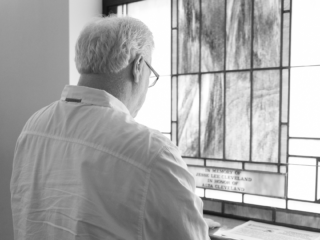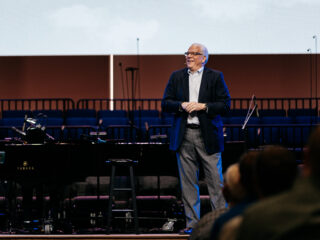A recent Gallup poll revealed that belief in God has fallen to an all-time low in America. According to the study, around 81% of Americans say they believe in God. That’s down from 87% in previous surveys.
The responses have been predictable. My atheist friends are telling me to join their side. God’s side is obviously losing. In fact, they say, Christianity has been on a losing streak for years. The Christians have lost Europe, and now they are losing North America. For them, the polling means the Christian message is now falling on deaf ears. Americans have come to the conclusion there is no God and we’ll have to make our own way through rational thinking and science.
Yeah, I laughed at that last one too.
Of course, my church friends are concerned. What will we do? Do we need to go door to door again as we did in the fifties and sixties? Do we need to have more revival services and larger youth rallies? Few friends seem to remember that’s what we did that got us to where we are now. But I digress.
Normally, I don’t pay attention to things like this. When you think about it, it doesn’t affect what I’m doing one way or the other. I’m still working in the same church doing my best to serve the community where I live in the name of Christ. This survey doesn’t change anything for me.
Yet, when I’m pressed to give an answer, most of my friends are shocked by my response.
I think the number is too high. I’m not being flippant. I’m serious. I think the number is too high.
First, let’s remember that religious surveys are notoriously unreliable. It’s not that people lie, but that they answer religious questions “aspirationally.” That is, most people answer the questions on religious surveys with the answers that they want to be true, not the actual truth. For instance, if you ask someone how many times a month they go to church, they will say four times a month. If you follow them during the month, you will find out that they actually went to church twice that month, but they fully intended to go to church four times. See the difference?
So, if you ask someone if they believe in God, they will say “yes” whether they believe in God or not because they really want to believe in God. They may not pray, go to church, or read a Bible, but they feel better about themselves if they believe in God. So, they say “yes” even though everything else in their lives says they have little to no awareness of God in their lives.
Second, we need to remember what we’ve done to the word “belief.” When we say we believe something, what have we actually said? When we say, “I believe it will rain” or, “I believe in my team”, what are we saying? Do we suppose the weather may change? Do I hope my team will win? This is a far cry from the depth and intensity of belief as is described in the New Testament.
Third, we need to understand what most people mean by “God”. Most people would be hard-pressed to give an intelligible answer to the question, “Who is God?” For a lot of people, God is something out there somewhere, something spiritual and thus unknowable. That may make sense to them but they really can’t figure it out. Something has to be out there to explain creation. They aren’t really sure, but they believe there’s something out there. Again, this is a far cry from the God of Abraham and David, Creator of the universe and Father of Jesus. God, for most Americans, is a fuzzy, distant myth that may or may not be true. They don’t know if there’s a God, but they’d really like for God to be real.
As for those of us in the church, we know that the sad “rule of thumb” is that the largest field for evangelism is the nearest local congregation. Most of those who say they know Jesus simply don’t. Most who claim to be Christians are name droppers. They know who Jesus is, but they’ve never met Him.
Any pastor can tell you about the 80/20 rule. Twenty percent of the members give 80% of the budget and do 80% of the work. The vast majority of church members do little more than show up on Sunday morning. I hate to be blunt about this, but it’s the truth. If I had a church where 80% of our membership was committed to God, I’d be a world changer.
The number is wrong because the question is wrong. Jesus never asked if anyone believed in God. He called people to follow Him. He called a lot of people, but few actually followed. The same is still true today. Many are called, but few answer.
Jesus knew He would never have a majority following in any culture. That’s why Jesus talked so much about salt and light. It doesn’t take much salt or light to change things. It doesn’t take many Christians to change the world, but it does take some. Jesus started with twelve. The upper room had a few more than one hundred when Pentecost fell.
Jesus knew from the beginning that it’s not the quantity of those who say they believe, but rather the quality of the belief in His followers that mattered. It’s not whether or not 80% of Americans believe in God that matters, but whether or not those who do believe are 100% committed.









